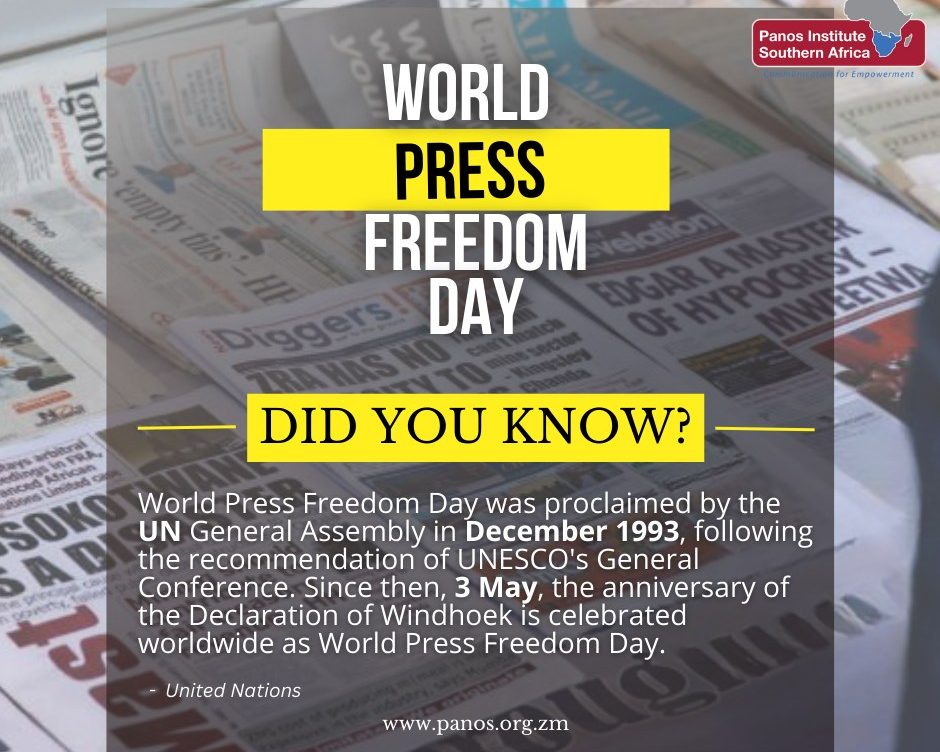
Panos calls for responsible use of AI to advance Press Freedom in the Digital Age
Lusaka, 03 May 2025 – Today, as the world marks World Press Freedom Day (WPFD) 2025, Panos Institute Southern Africa (PSAf) joins the global community in reflecting on the theme: “Reporting in the Brave New World: The Impact of Artificial Intelligence on Press Freedom and the Media.” We call on governments, media houses, technology companies, civil society, academia, the public and other stakeholders to harness Artificial Intelligence responsibly to defend press freedom and protect the right to information in this rapidly evolving digital age.
This year’s commemoration comes at a time when the world is experiencing the profound impact of Artificial Intelligence (AI) on journalism, freedom of expression, and access to credible information.
Since World Press Freedom Day was proclaimed in 1993, the media landscape has evolved significantly. These changes are deeply felt as newsrooms adapt to the digital shift and increasingly adopt AI tools for news gathering, verification, content production, and dissemination.
AI presents tremendous opportunities for the media in Southern Africa and beyond. It can enhance access to information for rural and marginalized communities, improve data processing, content verification and fact-checking, and enable journalists to translate and tailor content across various platforms and languages. This is especially significant for Southern Africa’s linguistically and geographically diverse society, where access to accurate, timely information remains a persistent challenge.
Access to information is a critical pillar in the democratioc foundations of any democratic society. It promotes transparency, accountability, and informed public discourse. PSAf commends local media houses and journalism training institutions that are embracing ethical AI policies, promoting transparency, and building digital resilience among media professionals. We however caution the media against irresponsible use of AI to breach journalistic ethics, and undermine the trust citizens and other stakeholders have invested in the media. AI must be used responsibly for journalistic excellence.
We recognize that emerging technologies, including AI, will continue to shape the media environment. They offer the potential to empower citizens, diversify content sources, and promote more inclusive participation in public debate. However, these advances also come with risks. AI is being used to produce and amplify misinformation, disinformation, hate speech and other kinds of information pollution, threatening and undermining democratic participation, especially during elections.
PSAf calls for urgent, inclusive, and multi-stakeholder collaboration to ensure AI is developed and applied in ways that protect freedom of expression and uphold the public’s right to information. We further urge the development of inclusive and ethical AI frameworks that address these challenges while supporting innovation.
In Zambia, as we approach the 2026 general elections, PSAf urges all stakeholders to take swift and coordinated action to counter AI-driven disinformation, protect journalists, and ensure media sustainability. As an organisation, we are collaborating with various actors across the region to create a healthy information ecosystem anchored on a free and independent media.
On this World Press Freedom Day, PSAf reaffirms its commitment to promoting media freedom, supporting fact-checking initiatives, and defending the right to information in Zambia. We echo the global call for AI to be guided by human rights principles, including accountability, transparency, and inclusivity.
World Press Freedom Day 2025 is not only a moment to celebrate the achievements of the press, it is a vital call to action to defend the independence, diversity, and sustainability of the media in this new digital era.
Issued by:
Vusumuzi Sifile
Executive Director, Panos Institute Southern Africa
Email: vusa@panos.org.zm